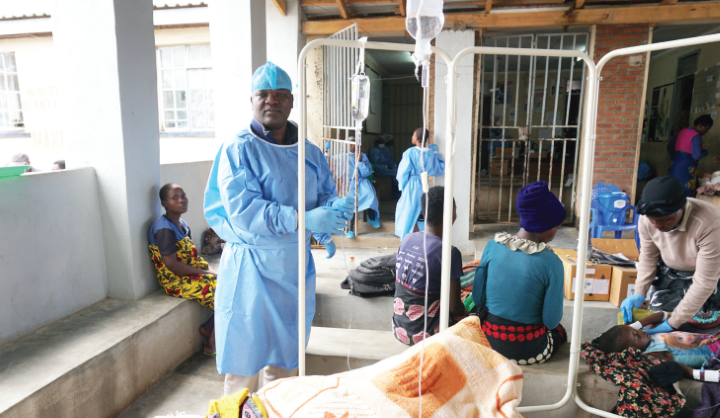Is there hope for cancer patients in Malawi?
 It was not yet time for her to give birth, but she suddenly started bleeding heavily.
It was not yet time for her to give birth, but she suddenly started bleeding heavily.
This was her fifth pregnancy and such a thing had never happened with her previous pregnancies.
“Surprisingly, I was not feeling any pain, not even labour pains,†says Ireen Phiri of Mnyangu Village, Traditional Authority Chilowamatambe, Kasungu.
She explains that doctors at Kasungu District Hospital conducted a Caesarean Section and she delivered a healthy baby.
Nevertheless, the problem persisted a few days after being discharged and she was referred to Kamuzu Central Hospital (KCH).
The 33-year-old was diagnosed with cervical cancer in February last year at Queen Elizabeth Central Hospital (QECH) in Blantyre.Â
“I didn’t know what it meant to have cancer and I could not ask further questions,†she says.
Since then, Phiri has been living with her aunt in Ndirande as she is required to meet a specialist every 21 days.
“They have already conducted surgery, but since three weeks ago, I have been told that there is no medication for my ailment at the hospital. At a private pharmacy, I was told the medication (Ifosfamide) costs K500 000,†she says.
According to Phiri, this is not the first time she has been told that the hospital has no drugs. She says her aunt has been buying her medicine from private pharmacies costing as much as K30 000 per dosage.
“This time around, the amount is too huge for her to afford,†says Phiri, whose husband and children are in Kasungu, but have never come to visit her due to lack of transport.
Elluby Mankhoma, a nurse working at QECH’s Oncology Department, says Phiri needs radiotherapy treatment and that she will be recommended for inclusion on a list of cancer patients to be flown abroad for medication by government.
“Since there is no medication, I have given up. I think I will just go back to Kasungu and live with my family,†she says.
Since Phiri was referred to Blantyre for treatment of the illness last year, she has never gone back to Kasungu. She has no job, but needs K200 for transport each time she is going for check-up and treatment.
Another cancer patient, Isaac Kalesi of Chimkonde Village, T/A Ganya in Ntcheu was diagnosed with skin cancer about five years ago and is in need of additional cancer treatment.
He has been frequenting QECH’s Oncology Department since 2010, but over the years, the problem has been the shortage of some cancer drugs.
“I haven’t taken the required drugs for some time now and the disease seems to be spreading. I was told that the treatment I need is not available here in Malawi,†says the 40-year-old, while raising his swollen right hand.
Mankhoma confirms that Kalesi needs radiotherapy treatment which is currently not available in Malawi.
“He is on the list of people who are awaiting government sponsorship to be treated abroad,†Mankhoma says.
She says three quarters of the patients are in need of radiotherapy at the Oncology Department.
Asked to explain the process, she said when a patient is in need of radiotherapy or any treatment that is only available abroad, the name is referred to the hospital’s committee of external referral and then names are submitted to Ministry of Health for further scrutiny. Usually, such treatment is facilitated in India.
Since it generally takes long for a patient to finally fly abroad for treatment, some have died while waiting whereas others fund their own treatment in neighbouring Tanzania and Zambia.
Director of Clinical Services in the Ministry of Health Dr Chithope Mwale, while admitting that the process is long, said MoH ensures that whoever needs treatment should get it at the right time.
He says currently patients on government ticket treatment are referred to India since it has been established that their hospitals are cheaper than those of South Africa, Tanzania, Zimbabwe and Zambia.
“This decision was arrived at after the ministry’s analysis of costs,†said Dr Mwale, who could not disclose the amount of money spent on a patient on external referral.
He said the costs vary depending on the stage of cancer.
Oncologist Dr Leo Masamba says there are many patients with different types of cancers who are in need of radiotherapy, but end up losing lives because they cannot afford to get treatment abroad.
“The main challenge which is being experienced in cancer management is lack of radiotherapy treatment. This is reducing the effect of cancer treatment in the country because a combination of chemotherapy and radiotherapy works better,†he notes.
Malawi Health Equity Network (Mhen) executive director Martha Kwataine points to the urgent need for Malawi to have a radiotherapy machine given the rise in non-communicable diseases, including cancer, in recent years.
“Government has the responsibility to provide this health need because not everyone who has been referred abroad may have that chance to access treatment. Many people are dying in the process,†she says.
Malawi needs about K3 billion to procure a radiotherapy machine.





